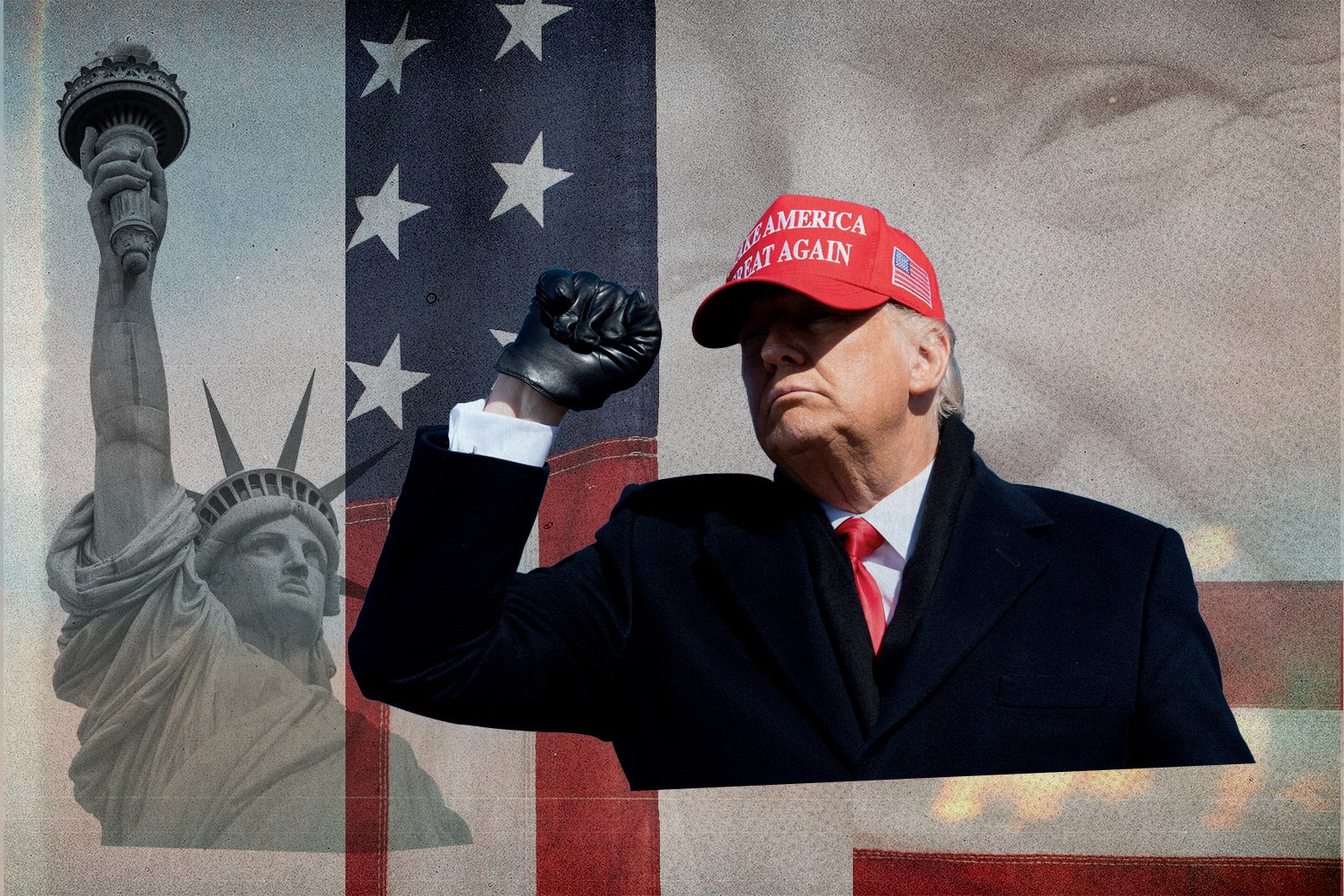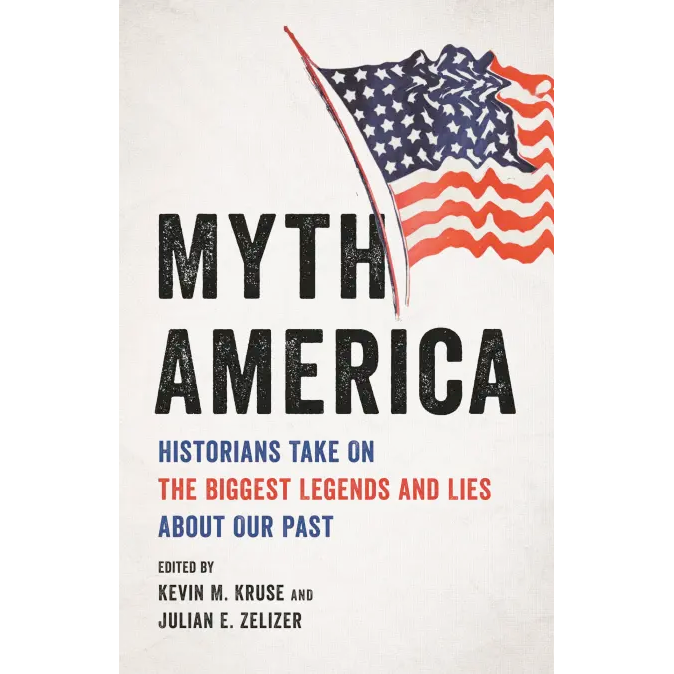The historians are concerned. We now live in a post-truth world, one in which “alternative facts” hold freight while inconvenient truths can be dismissed as “fake news.” In this “age of disinformation,” as Princeton historians Kevin Kruse and Julian Zelizer characterize it, nefarious actors distort the historical record without compunction. The vanishingly thin line between fact and fiction, truth and untruth, Kruse and Zelizer insist, sits at the center of the interlocking political crises in which Americans now find themselves.
Now Kruse and Zelizer have assembled some of their most esteemed colleagues to set the record straight. Their new edited collection, Myth America, looks to debunk certain “legends and lies” about the American past—from the idea that “the framers believed in ‘republics’ but disdained ‘democracy’ ” (dismantled in an essay by Akhil Reed Amar) to the notion that activists used “good” (mild and inoffensive) protest tactics during the Black freedom struggle of the mid-20th century (handled in a piece by Glenda Gilmore). Only by grappling with the past as it actually happened, Kruse and Zelizer assert, can Americans “understand where we stand now and where we might go in the future.”
In its attempt to explode particular myths, however, Myth America engages in its own mythmaking. The book fundamentally misunderstands the crises facing the U.S. and the world. By implying that misinformation is the principal cause of the partisan rancor, violence, and general dysfunction that mark our current political moment, the collection obscures our much bigger problems. And by localizing the threat of misinformation and disinformation almost exclusively within certain far-right segments of the conservative movement and the Republican Party, Myth America absolves not only other stripes of conservatism, but also the milquetoast technocratic liberalism that helped set the stage for this moment. It’s not a total wash. Many of the book’s essays—like those by Elizabeth Hinton, Daniel Immerwahr, and Eric Rauchway—are exemplary models of political and cultural history. But the political project that birthed Myth America is ultimately a dead end—one that will only reproduce and exacerbate our present crises.
It’s all Trump’s fault. While co-editors Kruse and Zelizer acknowledge the stubborn persistence of older, widely held, and bipartisan myths—like that of American exceptionalism—they locate the source of their “legends and lies” overwhelmingly on the Trumpist right. Most of the myths they tackle either stem from “a deliberate campaign of disinformation” waged by conservatives—often with “obvious partisan motives”—or “bolster ideological stances that reinforce the modern Right.” These include the Lost Cause myth (Karen L. Cox) and the myth of widespread, systematic voter fraud (Carol Anderson).
This emphasis on Trump and the GOP—which is sure to drive book sales and pump up online engagement among the MSNBC set—serves two interlocking political functions: First, it advances the idea of Trump as an aberration, thereby exonerating other conservatives (such as the Bulwark’s Charlie Sykes, who lent a blurb to Myth America). Second, it deflects criticism away from the politics in which Kruse and Zelizer are so deeply invested.
Myth America reinforces the idea that Trump is exceptional in ways both obvious and subtle, including, at times, through the exclusion of critical evidence. In their essay on the myth of the “free market,” for instance, Naomi Oreskes and Erik M. Conway claim that “conservative politicians and business executives” oppose the use of regulation and public investment to ameliorate social ills. While obviously true, this framing occludes the essential role played by liberals in the Democratic Party in our hard, decades-long turn toward market fetishism. Oreskes and Conway understandably focus on Ludwig von Mises, Friedrich Hayek, and their intellectual offspring. But as historian Lily Geismer compellingly argues, “Bill Clinton did more to sell neoliberalism than Milton Friedman.”
Another example: Michael Kazin’s contribution to Myth America rejects the idea that Socialists are dangerous opponents of democracy by properly situating them within the history of U.S. reform. But Kazin also suggests that the idea that socialism is “un-American” comes mostly or entirely from one political tradition. Although liberals, progressives, and anti-Communist leftists played conspicuous roles in supporting state-sponsored red scares throughout U.S. history, Kazin implicates only “conservative politicians and commentators” and “the Right.” To underscore this point, he opens his essay with Trump’s declaration during the 2019 State of the Union address that “America will never be a Socialist country.” But this speech drew enthusiastic applause from across the aisle, a fact that highlights the fully bipartisan history of American anti-socialism. Even progressives like Sen. Elizabeth Warren (D-Massachusetts) stood and clapped for Trump’s condemnation of the Socialist boogeyman.
Like most of the myths the volume tackles, the idea that Socialists are dangerous opponents of democracy is less a hallmark of the reactionary right than an expression of ruling-class interests—those of Republicans and Democrats alike—that’s perpetuated through popular discourse and mainstream politics. If Trump’s disregard for the truth helped shape his dreadful COVID-19 response, as Kruse and Zelizer suggest in their introduction, then why have liberals prematurely lifted mask mandates and other public-health measures and all but declared the pandemic over, even though 700,000 Americans have died of COVID during Joe Biden’s presidency? Similarly, Democratic and Republican leaders might diverge over their acceptance of basic climate science, as Oreskes and Conway show, but bipartisan fealty to fossil fuel interests and “market-based” solutions prevent both parties from taking meaningful action on the climate crisis. What good is the recognition of an urgent fact if it does not inform a path forward? What good is “the truth” if it brings you to the same unfortunate conclusions?
The Trump-as-exceptional thesis also requires, to some extent, rehabilitating past GOP monsters: Nixon, Reagan, and the Bushes, among others. In his essay on the Southern Strategy, for instance, Kruse argues that early 21st-century Republicans wanted to distance themselves from the party’s previous efforts “to enflame white resentment.” George W. Bush’s administration “featured a racially diverse cabinet,” Kruse observes, “and promoted policies such as immigration reform.” But in actuality, such moves were superficial at best. Bush simultaneously beefed up the deportation machine, supported the construction of fencing along the U.S.–Mexico border, and expanded a national security apparatus devoted, in large part, to the harassment, abuse, and destruction of communities of color at home and abroad. In its attempt to deconstruct one myth, then, Myth America has perpetuated another—that of a once-noble conservative movement and Republican Party.
In a similar vein, Myth America uncritically accepts a dangerous myth forged by segments of the conservative movement: that Republicans were once the party of “clear-eyed realists.” Kruse and Zelizer write, “Until recently, Republicans fashioned themselves as realists who would keep the irrational idealism of Democrats in check.” At the same time, the co-editors explain, these very Republicans regularly stretched the truth or otherwise “drift[ed] away from facts in ways big and small.” So how meaningful was their rhetorical appeal to pragmatism and “hard truths” in the first place? Today’s conservatives also claim to be the realists, willing to speak “the truth” regardless of how unpopular or “politically incorrect” it might be. As the “cool kids’ philosopher” Ben Shapiro is fond of saying, “Facts don’t care about your feelings.”
If Americans can simply stick to the truth, Myth America implies, we might just defang the insurgent Trumpist right, suture our wounds, and start on the path toward national reconciliation. It’s a bit odd to read a group of historians make this claim, however, as others in the profession have spent the past half-century arguing that knowledge, truth, and expertise are constructed, contingent, and contested, and historical archives (and the study of history itself) often reflect processes of dispossession, extraction, and silencing. Who has the authority to narrate the past? Whose truths appear in dominant historical narratives, and whose get left out? “Facts” are hardly neutral, self-evident, or unassailable. Rather, they are often expressions of power.
Myth America: Historians Take On the Biggest Legends and Lies About Our Past
Edited by Kevin M. Kruse and Julian E. Zelizer. Basic Books.
Slate receives a commission when you purchase items using the links on this page. Thank you for your support.
It is unclear what exactly Kruse and Zelizer hope to accomplish through this attempt to “set the record straight.” Of course, the desire to promote evidence-based analysis is an understandable response to birtherism, COVID denialism, QAnon, “America First” ethno-nationalism, the “great replacement theory,” rising antisemitism, “big lie” election claims, vicious attacks on LGBTQ people, and Jan. 6–style insurrectionism—all developments that thrive on easily disproven conspiracy theories. Yet the relentless focus on countering false claims reveals the centrist liberal tendency to see historical falsehoods more as causes than outcomes of political change. For Kruse and Zelizer, the current threat to U.S. democracy appears to center less on systems than on bad actors, whether they be conservative TV personalities, MAGA politicians, or Russian bots, who promote inaccurate and often uncritical historical narratives. There is an ineffectual particularism—not to mention a whiff of elitism—in their implication that historical literacy, informational authority, and the consumption of “better” information can “save our democracy.”
The problem is power, not party or personality or “knowledge.” A better approach might be to question if any private citizen, entity, or corporation, regardless of intent, partisanship, or competency, should possess the power and resources necessary to promote the scale of historical fictions promulgated by the Koch network, various corporate super PACs, or Fox News. Yet despite the inclusion of a minority of essays that do identify the bipartisan, elite nature of our most persistent myths—American exceptionalism (David A. Bell), the demonization of immigrants (Erika Lee), and the idea that the U.S. isn’t an empire (Immerwahr)—Myth America ultimately suggests that misinformation must be exposed and corrected by experts, not drowned out or destroyed through mass struggle and a fundamental transformation of material relations. The result is a work that appeals far more to individual intellect than collective condition or action, meaning that while it works well at distinguishing historical fact from fiction, its political impact will likely be minimal. As we watch the historical profession die before our eyes, we ought to expect more from its crème de la crème.

